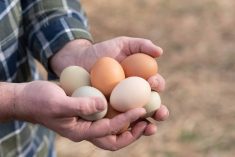Rick White was in Ottawa when I talked to him in early November. Rick is the executive director of the Canadian Canola Growers Association, and he was in Ottawa lobbying on behalf of western Canadian farmers. He called me from Ottawa rather than waiting until he was back at the CCGA office in Winnipeg because he was headed to China later in the week.
Rick had three items on his agenda for his China trip. First, he was going to encourage Chinese officials to accept the three new canola traits they have not yet approved. Then, he was going to talk about blackleg and dockage levels. Remember back in August 2016 when we were relieved that (after a visit from Prime Minister Trudeau) China agreed to delay a planned change to lower acceptable canola dockage levels to only one per cent? (Chinese officials were concerned about the spread of blackleg. Canadians were worried about the costs of cleaning canola down to one per cent dockage.) That 2016 agreement to keep dockage levels at a more reasonable 2.5 per cent expires in 2020. The CCGA is trying to convince China not to lower the dockage rate in 2020. Finally, his third item was tariffs. China has a nine per cent tariff on Canadian canola. “We could be making nine per cent more if that tariff was zeroed out,” he said.
Read Also

Health hazards are often overlooked risks on the farm
While quite different from the dangers posed by farm machinery, hazards such as loud noise or sun exposure require the same proactive attention, the Canadian Agricultural Safety Association says.
“We need to spend time with them there,” he told me. “In China, just like Japan, the way they do business is personal connections. It’s worth the investment, time and effort.”
The Canola Growers of Canada Association’s vision is “helping farmers succeed.” Rick’s work in China seems to fit into this, and I’m grateful that someone is lobbying on our behalf. But if you happen to be curious about how much farmers’ money the CCGA is spending to do this… well, I can’t tell you.
Who’s paying for what?
The graphic above comes from the website of the Saskatchewan Canola Development Commission (SaskCanola). If you’re a Saskatchewan farmer, this is the group that collects the $0.75/tonne levy on your canola sales. In Alberta and Manitoba, your levy is $1/tonne. In the graphic, that’s your money at the top, labelled “Grower Checkoff.”
Most of your checkoff money stays in your own province, where your local provincial organization does policy and research work. The provincial organizations also send $0.23/tonne off to the Canola Council of Canada — shown in the flower on the left side of the graphic. The Council also gets funding from its other members: seed and chemical companies and buyers that crush or export canola.
You’re familiar with the work of the Canola Council. This is the organization with a full staff of agronomists who speak at conferences and send you emails about things like clubroot, blackleg and why you should straight-cut canola. The Canola Council also does international lobbying work. When I was searching for details about China’s blackleg/dockage issue, I came across a great article by the Canola Council’s past President, Patti Miller, describing her work on this file.
You can find information about the Canola Council’s annual spending online. In 2017, the Council received $3.8 million from farmer levies. Add in fees from canola buyers, processors and chemical companies, and the Council’s core revenues were $8.8 million in 2017. With that core revenue plus project and grant revenues, the Canola Council spent $15.3 million in 2017.
What does the CCGA spend?
So what about the Canadian Canola Growers Association? You’re probably familiar with its work too. If you’ve taken out a cash advance, odds are you got it from the CCGA. Administering the federal government’s cash advance program is one of its main lines of work (as well as lobbying on behalf of farmers.)
At first glance, you might look at that SaskCanola graphic and assume that farmers fund the CCGA through levies, like the Canola Council. In fact, the Canadian Canola Growers Association only receives a token amount, $3,600 a year, from the farmer-funded provincial canola associations. Its “actual” money comes from administering the cash advance program. This includes the administration fees you pay when you take out a cash advance, but since that’s only $100/loan, that’s not the whole story. The rest of its revenue comes from lending money to farmers. The CCGA borrows money from the bank; it then lends it to you at a slightly higher rate. The difference between those rates is the profit that the CCGA uses to run its office and pay for lobbying activities.
How much does the CCGA spend on its office and lobbying? I don’t know.
The CCGA does not post its revenues and expenses online. Or print them in an annual report. The only way a farmer can access this information is to get elected as a board member on your local provincial organization, then convince the rest of the board members to appoint you as a provincial representative on the CCGA board.
Rick White said, “I wish we could be more transparent on the financial side.” The reason they can’t, he says, is because of the cash advance program. The CCGA borrows money from banks, it then competes with banks and FCC to lend money to farmers. The first $100,000 borrowed through the cash advance program is interest free — the federal government pays to subsidize this part of the loan. But farmers can choose to borrow an additional $300,000 at competitive interest rates. If the CCGA’s rates are higher than other options, farmers will take their business somewhere else. If the CCGA’s financial statements were public, “people would be able to calculate our banking arrangements,” Rick said. (Although, it’s worth noting that the Manitoba Corn Growers Association, which also offers cash advances, does mail its financial statements out to all of its farmer members.)
If the CCGA is reluctant to release its sensitive information, could it break the cash advance program out from the complete financial picture, and just tell farmers the total amount of cash advance revenues used to subsidize office staff and travel? “It’s misleading if you don’t disclose full financial statements,” Rick said. “You can’t paint half a picture.”
In the grand scheme of the ag world, this is a pretty minor detail. Most farmers that use the cash advance program that funds the CCGA are also canola growers. I feel confident that Rick White and his staff are using our money wisely, and truly lobbying in our best interests.
But, I can’t help but wonder, as farmers, if we aren’t going to be clear and transparent about how we’re spending our own money, how can we ask the governments and companies we deal with to be clear and transparent? Our canola-lobbying group is not directly accountable to the people who are paying its bills.
This CCGA’s funding structure works, despite its flaws. But if we were setting it up all over again, we likely wouldn’t do it this way. As new farmer-funded institutions get their start (for example, hemp growers lobbying for a new check-off), let’s all keep an eye out to make sure we build structures that are actually accountable to everyone who pays for them.
On another note, we had two winners!
We had lots of entries from readers, hoping to win a copy of Lee Klancher’s latest book, Tractor: The Heartland Innovation, Ground-Breaking Machines, Midnight Schemes, Secret Garages, and Farmyard Geniuses That Mechanized Agriculture.
We have two copies on hand, so we’re giving them both away.
At the risk of ruining a Christmas surprise or two, I’ll tell you that the winners are Carol Bere from Crystal City, Man., and Nancy Hanson from Cereal, Alta. Your books are on the way!
If you didn’t win, you can still find the book online at octanepress.com, or buy it from Amazon for just under $40.
— Leeann Minogue















